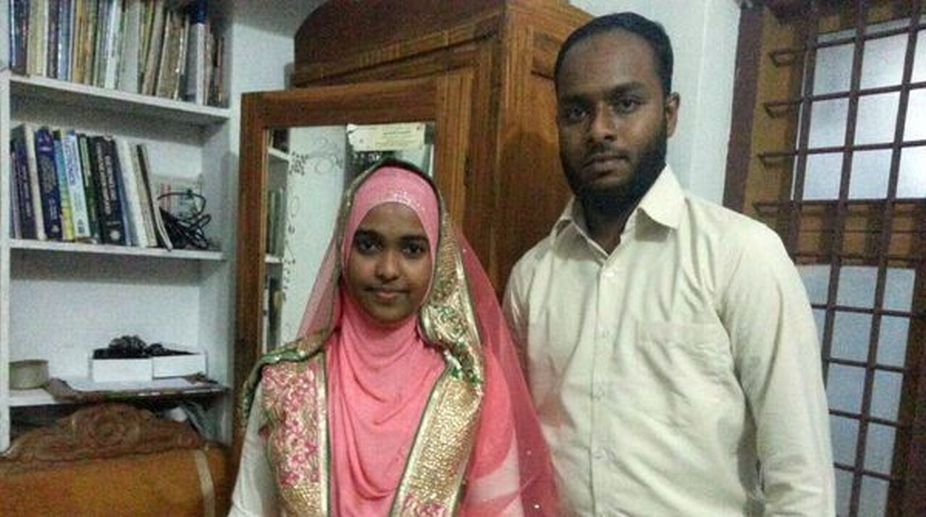Akhila Ashokan, a 24- year-old medical student from a village near Kottayam married a 27- year-old Muslim youth, Shefin Jehan, on 19 December 2016, the year 11 Muslim youth from Kerala disappeared, allegedly to join ISIS.
Therbiyat Islam Sabha of Kozhikode, not a banned organisation, is reported to have facilitated Akhila’s conversion to Islam and taking on the name Hadiya. KM Ashokan, Akhila’s father was distraught as his only daughter married without his consent and, at that, a man from another religious community.
He moved the Kerala High Court seeking annulment of Akhila’s marriage. A Division Bench comprising Justices Surendra Mohan and Mary Joseph annulled the marriage on the grounds that parents of Akhila were neither present at her wedding, nor had they given consent. The learned judges called the marriage a “sham.”
The Bench did not ascertain from Akhila, who is not a minor, whether she was forced into marriage by any hidden persuaders. Her testimonies that all her actions were voluntary and no coercion was involved were ignored by the court which committed her in parental custody in May this year.
Since then she has been kept under surveillance in the two-room tenament of her parents, guarded round-the-clock by a posse of 37 personnel of the Kottayam district police. She is not even allowed to complete her medical course. Freedom of religion, which includes freedom to profess, practise and propagate, is guaranteed under Article 25 of the Constitution.
Akhila, aka Hadiya, continues to practise Islam, even in captivity, much to the chagrin of her parents who have pinned their hopes on the Supreme Court approached by her husband, Shefin Jehan, himself a convert to Islam from Hinduism, to uphold the annulment granted by the Kerala High Court.
A Bench of the Supreme Court comprising the then Chief Justice JS Khehar and Justice DY Chandrachud on 16 August directed the National Investigation Agency, a counter-terror organisation, to probe the conversion and marriage of Akhila which was annulled by the Kerala High Court on the ground it was a case of “love Jihad.”
When Jehan’s lawyer Kapil Sibal requested the court to interview Akhila, Justice Khehar referred to the Blue Whale challenge, the internet game that provokes players to do self-destructive tasks before taking the ultimate step of death by suicide. “Such things can drive people to do anything,” he said. Earlier, the Supreme Court had asked the Kerala police to share the details of their investigation in the case with the NIA.
Retired Supreme Court Judge RV Raveendran has been directed to supervise the entire investigation. “Before taking a final call, the court shall require the presence of the girl. It will decide the issue after getting inputs from all, including the NIA, Kerala government and others,” the Bench observed.
The court said that it was entrusting the investigation to the NIA as a ‘neutral agency’ to get a whole picture and to ascertain whether the particular case was an isolated one or there was something wider to the issue. Ashokan, father of Akhila, alleged there was a well-oiled systematic mechanism for conversion and Islamic radicalization in place in Kerala.
Every Muslim-non-Muslim marriage cannot be construed as “Love Jihad.” The allegation is that Muslim leaders sponsor young men with leisure, money, accessories and training to fall in “love” with unsuspecting Hindu or Christian girls and persuade them to convert to Islam.
Tradition has it that Sage Parasurama created Kerala by causing the Arabian Sea to recede and gave it to Brahmins, known as Namboodiris, brought from the north. It is to the credit of Adi Sankara of Kerala that he had established the glory of Vedanta over the whole of India, from Dwaraka to Assam and Kanyakumari to Kashmir, in the course of a tour of just 16 years.
According to the Mohenjodaro epigraph, Kerala became a distinct political and geographical entity by 2,500 BC. If the 100 per cent Hindu population of the State has come down to 55 per cent by now and Muslims and Christians constitute 27 and 18 per cent respectively, it can be attributed to Kerala’s early contact with the outside world, notably Arabia, Egypt and Rome.
St Thomas, one of the disciples of Jesus Christ, reached Kerala in 52 AD and a section of Namboodiris converted to Christianity and ever since the community has been growing in the State.
History tells us that Islam entered India by conquest, beginning with a military invasion through the north-west frontier in 711 AD, followed by the Ghazni raids in the 11th century, the slave dynasty in the 13th century and finally the Mughals, but is silent on its arrival in Kerala through peaceful conversion much earlier, during the lifetime of Prophet Mohammad himself.
Kerala then was a part of the Chera Empire, one of the three empires that flourished in South India. Cheraman Perumal ruled Kerala from the ancient port city of Kodungallur and heard about the Prophet first from Arab traders who frequented his kingdom.
Curious by nature, Perumal wanted to know more about the new religion first hand. Abdicating his throne, he divided his kingdom among family members and set sail for Arabia. He met the Prophet in Jeddah and converted to Islam. The Prophet renamed Perumal as Tajuddin and he became a great friend of Malik Ibn Dinar, a disciple of the Prophet. Dinar gave his sister Raziya Beebi in marriage to Tajuddin, aka Perumal.
On his return journey he fell ill and died at Zafar in Yemen where he was buried. Before his death Perumal wrote letters to Chera chieftans to whom he had entrusted his kingdom, asking them to extend all assistance to Arabs visiting Kodungalluur, cradle of the major religions of the world and known for its cultural syncretism.
The Prophet, meanwhile, had deputed Dinar to propagate the tenets of Islam and spread the new religion in the Chera kingdom.
Armed with the letter of introduction from Perumal, Dinar and entourage, which included Raziya Beebi, called on the new rulers of Cheraman who allotted the visitors Arathali temple along with its lands. Dinar built the Cheraman Juma Masjid on the temple land in 629 AD, claimed to be one of the oldest in Islamdom, and became its first Ghazi.
Buried in its south-eastern corner are the mortal remains of Malik Ibn Dinar and Raziya Beebi, widow of Cheraman Perumal.
The original masjid was built in the style of Kerala temples with gabled roof and kuthuvilaku (brass oil lamp) and a pond in the front. In the 1980s, a superstructure was built over the original structure with minarets and a dome to give it an Islamic look.
This little known Kerala mosque was made world famous by Prime Minister Narendra Modi when he presented a gold-plated replica of it to King Salman Ibn Abdulaziz of Saudi Arabia, custodian of Islam’s most sacred Masjid at Haram in Mecca and Masjid al Nabawi in Medina, during his visit to the kingdom last year.
For the first time in the history of Kerala, conversion to Islam from Hinduism or Christianity has become suspect in the eyes of law enforcement authorities. When a woman converts to Islam, it is dubbed ‘love Jihad.’
That seems to be the case with Akhila. The Kerala police so far has not been able to produce a shred of evidence that there was any deception or fraud in her conversion and marriage.
Sharing a room with her Muslim friends Jaseena and Faseena from 2011 to 2015 while studying homoeopathy in Salem, Tamil Nadu, Akhila was attracted by their religious rituals and practices and started observing them. She accepted Islam as her faith in 2015.
The Preamble to the Constitution postulates that the people of India have resolved to constitute India as a sovereign, democratic Republic to secure for its citizens, among other things, “liberty of thought, expression, belief, faith and worship.” Only on 17 August, a ninejudge Constitution Bench of the Supreme Court, in the Justice KS Puttaswamy (Retd) and others versus the Union of India, endorsed these as Fundamental Rights. Should Akhila be deprived of her Fundamental Rights?
(The writer is a veteran journalist and former Director of The Statesman Print Journalism School)










